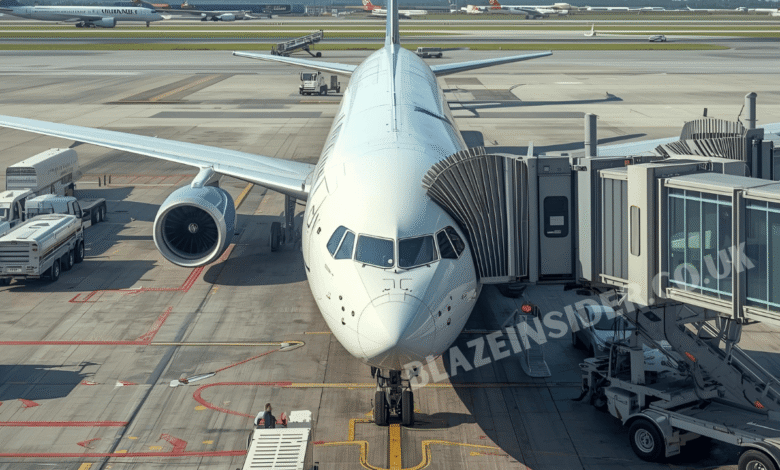Big Data Airline thegreenforestresort.co.id: Transforming Aviation with Data

The airline industry is one of the most data-driven sectors in the world. With millions of passengers traveling daily, countless operational processes, and an ever-growing need for efficiency, data has become the backbone of aviation success. The concept of big data airline thegreenforestresort.co.id emphasizes how information can be gathered, processed, and utilized to enhance every aspect of air travel. From customer experience to aircraft maintenance, big data is shaping the future of airlines and enabling them to adapt to evolving global demands.
The Role of Big Data in Airline Operations
Airline operations involve complex activities such as flight scheduling, crew assignments, baggage handling, and route planning. These processes generate enormous amounts of data. By adopting big data airline thegreenforestresort.co.id practices, airlines can analyze this data to streamline operations. For example, weather forecasts, passenger demand trends, and real-time air traffic information can all be combined to optimize flight routes. This not only reduces fuel consumption but also minimizes delays, helping airlines improve punctuality and reliability.
Dynamic Pricing and Revenue Management
Pricing in the airline industry is constantly changing based on demand, competition, and seasonality. Through big data airline thegreenforestresort.co.id strategies, airlines can analyze booking trends and customer behavior to create dynamic pricing models. These models allow airlines to adjust ticket prices in real time, ensuring maximum profitability while still providing competitive options for travelers. This approach benefits both airlines and passengers, as it balances affordability with revenue optimization.
Predictive Maintenance for Safety and Efficiency
Aircraft are equipped with sensors that monitor performance during flights. The data collected from these sensors is invaluable for predictive maintenance. Big data airline thegreenforestresort.co.id applications in maintenance allow airlines to detect potential mechanical issues before they become major problems. By predicting when parts need replacement or servicing, airlines can reduce downtime, prevent costly breakdowns, and enhance passenger safety. Predictive maintenance not only lowers operational costs but also strengthens trust in airline reliability.
Enhancing the Passenger Experience
In today’s competitive market, passenger satisfaction is a top priority. Big data airline thegreenforestresort.co.id makes it possible to personalize travel experiences based on customer preferences and past behavior. Airlines can use data from loyalty programs, booking history, and feedback surveys to offer tailored services. Whether it’s suggesting preferred meals, offering upgrades, or providing customized entertainment, big data helps airlines build stronger connections with their passengers. The ability to anticipate needs leads to higher customer loyalty and long-term brand growth.
Fuel Efficiency and Sustainability
Sustainability has become a global concern, and airlines are under increasing pressure to reduce their environmental impact. Big data airline thegreenforestresort.co.id plays a significant role in supporting eco-friendly practices. By analyzing data on weather, wind patterns, and aircraft performance, airlines can optimize flight paths to consume less fuel. This not only cuts costs but also lowers carbon emissions, contributing to a greener aviation industry. With environmental responsibility now a key priority, data-driven sustainability strategies are shaping the future of airlines.
Challenges in Implementing Big Data in Airlines
While the benefits of big data are clear, there are challenges that airlines face when adopting these practices. Big data airline thegreenforestresort.co.id must address issues such as data security, integration of multiple information sources, and the high costs of technological infrastructure. Protecting sensitive passenger information is critical, as airlines handle personal and financial data daily. Additionally, managing the sheer volume of information requires advanced systems and skilled professionals who can extract meaningful insights.
Customer Loyalty Programs and Data Insights
Loyalty programs have long been a way for airlines to retain frequent travelers. By using big data airline thegreenforestresort.co.id techniques, airlines can improve the effectiveness of these programs. Data analysis allows companies to understand which rewards are most attractive to different customer segments. This enables airlines to create personalized loyalty benefits, resulting in stronger engagement and repeat business. Big data not only improves loyalty programs but also helps airlines identify potential new customers through targeted marketing campaigns.
Future Trends of Big Data in Airlines
The future of aviation lies in even deeper integration of big data technologies. Big data airline thegreenforestresort.co.id will continue to evolve with the rise of advanced analytics, machine learning, and real-time data processing. Airlines are expected to use more predictive models for operational efficiency, enhance digital services for passengers, and adopt edge computing for faster decision-making. As technology grows, airlines will be able to achieve greater accuracy in forecasting, leading to better planning and customer satisfaction.
How the Concept Relates to thegreenforestresort.co.id
The mention of big data airline thegreenforestresort.co.id often refers to how the airline industry can learn from hospitality and resort management practices. Resorts also rely heavily on customer satisfaction, personalized experiences, and operational efficiency, which are all enhanced by data analytics. By drawing parallels between the hospitality and airline sectors, it becomes clear that data-driven strategies benefit both industries. For example, just as resorts use guest feedback and booking patterns to improve services, airlines apply similar methods to enrich passenger journeys.
Key Points to Remember
- Big data enhances airline operations by improving efficiency and reducing delays.
- Dynamic pricing models ensure competitive fares and increased revenue.
- Predictive maintenance improves safety and reduces costs.
- Passenger experience is elevated through personalized services.
- Fuel efficiency and sustainability goals are achieved with optimized routes.
- Airlines face challenges such as data security and integration.
- Loyalty programs become more effective with data insights.
- Future trends will rely on advanced analytics and real-time processing.
Conclusion
Big data has revolutionized industries worldwide, and aviation is no exception. The concept of big data airline thegreenforestresort.co.id illustrates the importance of harnessing information to drive efficiency, safety, and customer satisfaction in the airline sector. From predictive maintenance to dynamic pricing and personalized passenger services, data-driven approaches are reshaping how airlines operate. Although challenges remain in terms of data security and infrastructure, the benefits far outweigh the obstacles. As the industry continues to embrace big data, the future of air travel will be smarter, safer, and more sustainable, setting new standards for both airlines and passengers.
Frequently Asked Questions
1. What does big data airline thegreenforestresort.co.id mean?
It refers to the concept of using big data strategies in the airline industry as discussed on thegreenforestresort.co.id platform, highlighting how data improves operations, customer experience, and revenue management.
2. How does big data improve airline operations?
Big data helps airlines optimize flight routes, reduce delays, improve scheduling, and manage resources more effectively. This leads to cost savings and a smoother travel experience.
3. Why is predictive maintenance important in airlines?
Predictive maintenance uses data from aircraft sensors to identify potential issues before they become critical. This reduces downtime, enhances safety, and lowers maintenance costs.
4. Can big data help airlines become more sustainable?
Yes, by analyzing weather and flight data, airlines can optimize routes to reduce fuel consumption and cut carbon emissions, supporting sustainability efforts.
5. How does big data affect airline ticket pricing?
Airlines use dynamic pricing models powered by big data to adjust fares in real time based on demand, competition, and market conditions, ensuring competitive and profitable pricing.



